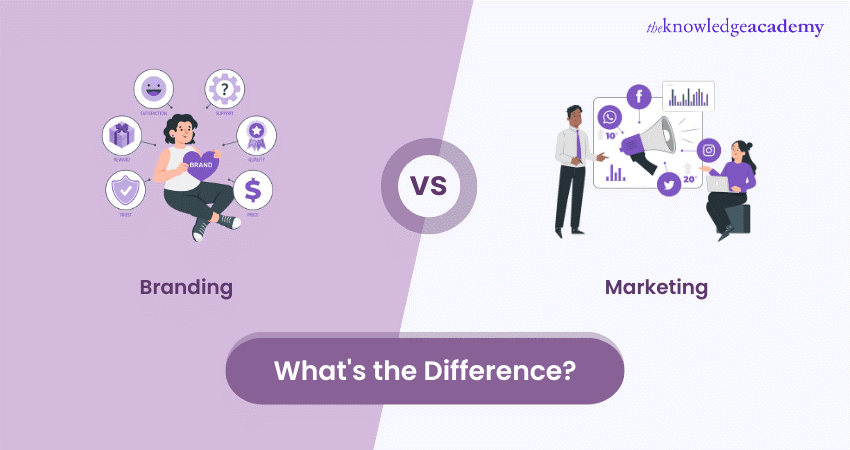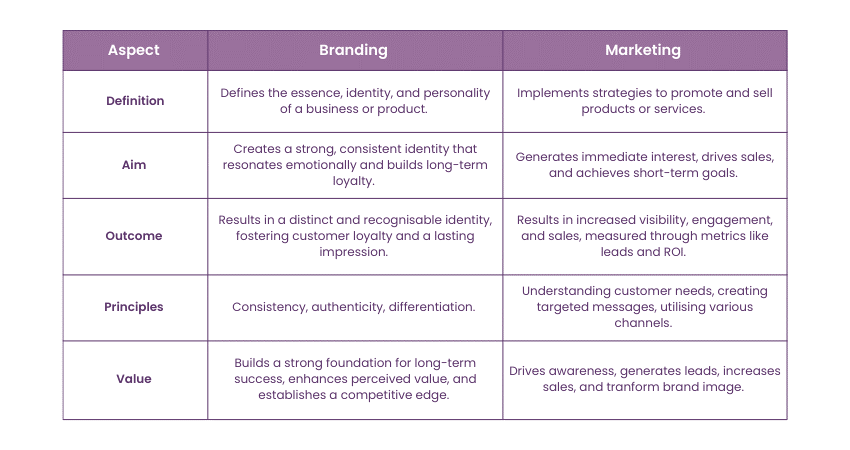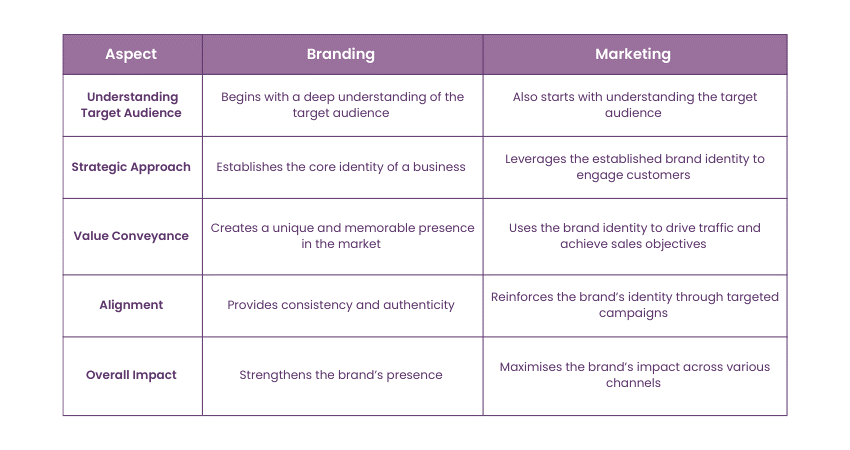We may not have the course you’re looking for. If you enquire or give us a call on +44 1344 203 999 and speak to our training experts, we may still be able to help with your training requirements.
Training Outcomes Within Your Budget!
We ensure quality, budget-alignment, and timely delivery by our expert instructors.

In today’s business landscape, both Branding and Marketing are crucial for establishing a successful presence and connecting with customers. Although often used interchangeably, these two concepts serve distinct purposes and play unique roles in a company's strategy. Understanding the differences and similarities between Branding and Marketing can help you leverage both effectively to build a strong, cohesive business strategy.
Table of Contents
1) What is Branding?
2) What is Marketing?
3) Difference Between Branding and Marketing
4) Similarities Between Branding and Marketing
5) Conclusion
What is Branding?
Branding is the process of creating a unique identity for a business, product, or individual. It involves developing a name, logo, design, and messaging that collectively shape how a brand is perceived by its audience. Branding is more than just visual elements; it encompasses the entire experience and perception that customers have with a brand.
Effective Branding aims to establish a distinctive presence in the market, differentiate a business from its competitors, and foster a strong emotional connection with customers. It reflects the core values, mission, and culture of the brand, creating a consistent and memorable identity. Through Branding, businesses can build trust, loyalty, and recognition, which are vital for long-term success.
What is Marketing?
Marketing refers to the activities and strategies used to promote and sell products or services. It involves researching, planning, executing, and analysing various tactics to reach potential customers and drive sales. Marketing strategies often include advertising, public relations, social media, content creation, and sales promotions.
The primary goal of Marketing is to attract and engage potential customers, communicate the value of a product or service, and ultimately drive sales. Marketing efforts are often short-term and focused on specific campaigns or promotions designed to achieve immediate results. It involves understanding customer needs and preferences, creating targeted messages, and utilising various channels to reach the intended audience.
Elevate your marketing skills with our Marketing Courses – Join now!
Difference Between Branding and Marketing
Here are the differences between Branding and Marketing:

1) Definition
Branding and Marketing are two fundamental aspects of business strategy, but they serve different functions. Branding is the process of defining the essence of a business or product. It involves establishing its identity, values, and personality. Branding shapes how a brand is perceived and remembered by its audience. This strategic process focuses on creating a unique image and emotional connection with customers, which endures over time. It’s about crafting a narrative that resonates with the audience and differentiates the brand from competitors.
Marketing, in contrast, is concerned with the implementation of strategies designed to promote and sell products or services. It encompasses a range of tactics and channels used to achieve sales objectives. Marketing involves identifying target audiences, creating campaigns, and utilising various media to attract and convert potential customers. While Branding is about defining what a brand stands for, Marketing is about executing strategies to communicate and deliver that brand promise to the market.
2) Aim
The aim of Branding is to establish a strong, consistent identity that resonates emotionally with customers. It seeks to build long-term loyalty and trust by creating a meaningful presence in the market. Effective Branding helps forge a deep connection with the audience, ensuring that the brand remains memorable and significant in their minds. It’s about positioning the brand in such a way that it becomes a preferred choice among consumers, even in the face of competition.
Marketing, on the other hand, aims to generate immediate interest and drive sales through targeted campaigns and promotions. Its focus is on achieving short-term goals such as increasing visibility, acquiring leads, and boosting sales figures. Marketing strategies are designed to reach potential customers through various channels, such as advertising, social media, and email campaigns, with the goal of converting interest into action. While Branding builds the foundation for a business’s identity, Marketing leverages that foundation to achieve specific sales objectives.
3) Outcome
The outcome of Branding is the creation of a distinct and recognisable identity that helps a business stand out from its competitors. Effective Branding results in a strong, memorable image that fosters customer loyalty and creates a lasting impression. It influences how customers perceive the brand, affecting their attitudes and behaviours towards it. Branding helps build a solid reputation and establishes a competitive edge, leading to long-term success and stability.
In contrast, the outcome of Marketing is measured through increased visibility, engagement, and sales. Marketing efforts aim to drive immediate results, such as generating leads, converting prospects, and boosting revenue. The effectiveness of Marketing is often evaluated through metrics such as leads generated, conversion rates, and Return on Investment (ROI). While Branding creates the foundation for success, Marketing focuses on driving measurable outcomes that contribute to the business’s growth and profitability.
4) Principles
The principles of Branding include consistency, authenticity, and differentiation. A successful brand maintains a consistent message and visual identity across all touchpoints, ensuring that it remains recognisable and coherent. Authenticity is crucial; a brand must stay true to its core values and beliefs to build trust and credibility with its audience. Differentiation is also essential; a brand must distinguish itself from competitors by highlighting its unique attributes and value proposition.
Marketing principles focus on understanding customer needs, creating targeted messages, and utilising various channels effectively. Successful Marketing involves researching and analysing the target audience to tailor messages that resonate with their preferences and pain points. Creating compelling content and offers that meet customer needs is key to attracting and engaging potential buyers. Additionally, Marketing strategies must leverage appropriate channels—such as digital platforms, social media, and traditional media—to reach the audience effectively and drive desired actions.
5) Value
The value of Branding lies in its ability to build a strong, memorable identity that fosters customer loyalty and trust. A well-defined brand creates a solid foundation for long-term success by establishing a clear and compelling presence in the market. It helps a business differentiate itself from competitors, build meaningful connections with customers, and create a lasting impression that endures over time. Effective Branding also enhances the perceived value of products or services, making them more attractive to potential customers.
Marketing adds value by driving awareness, generating leads, and increasing sales. It translates the brand’s value proposition into actionable strategies that attract and convert customers. Marketing efforts help communicate the brand’s message, showcase its offerings, and highlight its benefits to the target audience. By effectively promoting products or services, Marketing helps drive revenue and achieve business objectives. While Branding builds the foundation for a strong market presence, Marketing leverages that foundation to achieve measurable results and drive business growth.
Unlock your Digital Marketing potential with our Digital Marketing Courses – Sign up now!
Similarities Between Branding and Marketing
Despite their distinct roles, Branding and Marketing share several important similarities that contribute to business success. Both are essential components of a comprehensive strategy to connect with customers and drive growth. They begin with a deep understanding of the target audience, which is crucial for crafting effective communications that resonate with potential customers.

Branding and Marketing both rely on strategic approaches to conveying value. Branding establishes the core identity of a business, creating a unique and memorable presence in the market. This foundation allows Marketing efforts to be more impactful, as they build upon a well-defined brand identity. Marketing then takes this established identity and leverages it to engage customers, drive traffic, and achieve specific sales objectives.
When Branding and Marketing are aligned, they create a cohesive message that enhances overall business performance. Effective Branding provides the consistency and authenticity needed for Marketing campaigns to resonate more deeply with audiences. Conversely, Marketing reinforces the brand’s identity through targeted campaigns and promotions. Together, they create a unified approach that strengthens the brand’s presence and maximises its impact across various channels.
Conclusion
In summary, Branding and Marketing are distinct yet complementary components of a successful business strategy. Branding focuses on creating a unique identity and building long-term relationships with customers, while Marketing aims to promote products or services and drive sales. Understanding the differences and similarities between these two concepts allows businesses to develop a comprehensive strategy that effectively combines both elements.
Learn how to leverage your online presence to drive real results - register for our Influencer Marketing Course today!
Frequently Asked Questions

Content Marketing is highly effective for Branding, as it helps establish a brand’s authority, share its story, and engage with the audience. By providing valuable and relevant content, businesses can build trust and strengthen their brand identity.

Marketing strategies may achieve short-term goals, but they are less effective without a brand strategy. A strong brand strategy provides direction and consistency, ensuring that Marketing efforts align with the brand’s identity and long-term objectives.

Brand Marketing includes activities and strategies designed to build and enhance a brand’s identity and reputation. This encompasses brand storytelling, visual identity, brand positioning, and creating emotional connections with customers through various Marketing channels.

The Knowledge Academy takes global learning to new heights, offering over 30,000 online courses across 490+ locations in 220 countries. This expansive reach ensures accessibility and convenience for learners worldwide.
Alongside our diverse Online Course Catalogue, encompassing 19 major categories, we go the extra mile by providing a plethora of free educational Online Resources like News updates, Blogs, videos, webinars, and interview questions. Tailoring learning experiences further, professionals can maximise value with customisable Course Bundles of TKA.

The Knowledge Academy’s Knowledge Pass, a prepaid voucher, adds another layer of flexibility, allowing course bookings over a 12-month period. Join us on a journey where education knows no bounds.

The Knowledge Academy offers various Digital Marketing Courses, including the Business Branding Course, Social Media Marketing Course, and Influencer Marketing Course. These courses cater to different skill levels, providing comprehensive insights into Key Value Proposition of Google Search Campaigns.
Our Digital Marketing Blogs cover a range of topics related to Branding Strategy, offering valuable resources, best practices, and industry insights. Whether you are a beginner or looking to advance your Digital Marketing skills, The Knowledge Academy's diverse courses and informative blogs have got you covered.
Upcoming Digital Marketing Resources Batches & Dates
Date
 Business Branding Course
Business Branding Course
Fri 22nd Nov 2024
Fri 20th Dec 2024
Fri 17th Jan 2025
Fri 21st Feb 2025
Fri 4th Apr 2025
Fri 6th Jun 2025
Fri 25th Jul 2025
Fri 7th Nov 2025
Fri 26th Dec 2025







 Top Rated Course
Top Rated Course



 If you wish to make any changes to your course, please
If you wish to make any changes to your course, please


